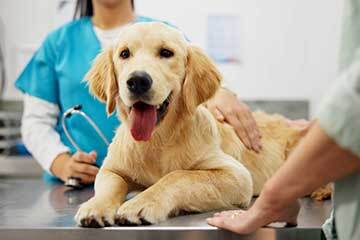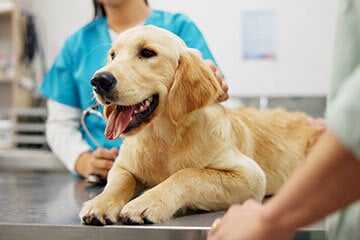"Some policies exclude hereditary conditions common in certain breeds - like hip dysplasia in Labradors or heart issues in Cavaliers. Check if your dog's breed has specific exclusions before buying a policy."
Compare dog insurance quotes
When you're getting a dog insurance quote, you've got to first think about what level of cover you want. You've got a few options:
-
Lifetime pet insurance - This is usually the most comprehensive type of dog insurance. It covers your dog for life, and any conditions that start when the policy is active.
-
Maximum-benefit pet insurance - You have a pot of money per condition (illness and injury). Once the pot runs out for that condition, you have to cover the cost yourself. If your dog gets a new condition, your insurer starts another pot of money for treatment.
-
Time-limited - It covers a condition for a certain time, usually 12 months from when your pet started treatment.
-
Accident-only pet insurance - Only covers your dogs for accidents like a fracture.
We'll go into more detail on these later.
How to compare dog insurance quotes
Comparing dog insurance policies is a great way to see the different types of cover available. When we've got your list of quotes ready, you can click the 'more info' button. It lists what the policy covers, and what it doesn't.
Tell us about your dog
What cover do you need?
Compare dog insurance quotes
Types of dog insurance policies explained
There are 4 different types of dog insurance to choose from:
Accident-only
This only covers accidents, for example, your dog cutting their leg on something or getting a fracture.
It's often the cheapest policy (a bit like third-party only if you have a car) and the least comprehensive because it only covers accidents.
Time-limited
This is the next level up from accident-only. It comes with a specific amount of cover (pot of money) for treatment.
You're only covered for 12 months of treatment or until the pot of money runs out, whichever comes first.
Insurers usually start the year's cover from when the treatment starts.
It's one of the cheapest types of cover, and you get some protection for different illnesses and accidents. But it'll stop after 12 months whether you've used your pot of money or not.
It's not a great choice if your dog is diagnosed with an ongoing condition, like Arthritis.
Maximum-benefit
This is one of the more comprehensive types of dog insurance.
You have a pot of money per condition. For example, a pot for injuries, another one for conditions like Gastroenteritis.
But once these pots have run out, you're on your own. You'd have to pay to cover these conditions yourself.
Again, it's not a great policy if your dog is diagnosed with a condition that needs ongoing treatment. But it's more comprehensive than the time-limited and accident-only.
Lifetime cover
This is probably the most comprehensive type of dog insurance. It covers accidents, illnesses and injuries for the duration of your dog's life.
If your dog develops a condition that'll need treatment for life, life time insurance covers it. That's as long as you keep renewing the policy.
There's no limit on this like there would be on the maximum-benefit policy. You just need to make sure you renew the policy every year to keep it active.
What's the best insurance type for my dog?
It depends on your dog, for example, it's age, breed and health history can all have a bearing on the type of policy you choose.
But really, opting for a lifetime policy is probably the best option. It covers your pet for life, and any long-term conditions that they might develop. It also covers accidents and illnesses, not just accidents.
Maximum-benefit is probably the next best option, but remember that you only have a limited amount of cover per condition.
Accident-only and time-limited are more like basic safety nets.
If you've got a dog with a pre-existing condition, remember that if you switch insurers, their pre-existing condition won't be covered by the new insurer.
If you've got a working dog, insuring them is slightly different. If your dog does herding, shooting, guarding, or even assistance work in some cases, you'll need a specialist policy. We'll talk more about this in a bit.
Insurance for dogs with pre-existing conditions
Pre-existing conditions aren't included as standard on most pet insurance policies - but there are specialist pet insurers out there that can help.
Try searching for mainstream pet insurers that cover pre-existing conditions.
Pet insurance for pre-existing conditions can come with caveats though, like cover limits and exclusions. Our key piece of advice: always read your policies terms and conditions so you know what's covered.
We unfortunately don't compare pet insurers that specialise in pre-existing conditions. But you could still get a standard pet insurance policy. It would cover everything but treatment for the pre-existing condition.
For example, if your pet had arthritis, you can't claim on your policy for pain relief. You'd have to pay for this yourself.
But if your dog got a cut on their leg and needed treatment or stitches, your pet insurance should cover this.
What our pet insurance expert says
Frequently asked questions
Are there any breed-specific considerations I should make when buying dog insurance?
Yes, it might be worth choosing a policy specifically for your dog's breed. That's because some breeds of dog are more prone to illnesses than others. Here's a list of common health conditions in different breeds:
| Breed | Common Health Conditions |
|---|---|
|
German Shepherd
|
Hip dysplasia, elbow dysplasia, arthritis, joint disorders
|
|
Golden Retriever
|
Hip and elbow dysplasia, heart conditions, cancer (e.g. hemangiosarcoma)
|
|
Labrador Retriever
|
Exercise intolerance and collapse (EIC), obesity-related joint issues, Von Willebrand Disease (bleeding disorder).
|
|
English Bulldog
|
Brachycephalic airway syndrome, hip dysplasia, cherry eye, entropion (eyelid inversion)
|
|
Cocker Spaniel
|
Ear infections, progressive retinal atrophy (PRA), cataracts glaucoma, heart disease, patellar luxation
|
|
Dachshund
|
Intervertebral disc disease (back issues), patellar luxation, hip dysplasia
|
|
Cavalier King Charles Spaniel
|
Mitral valve disease (early-onset heart failure)
|
|
Rhodesian Ridgeback
|
Hip dysplasia, dermoid sinus, degenerative myelopathy, hypothyroidism, bloat
|
|
Bulldog
|
Hip dysplasia, patellar luxation, skin-fold dermatitis, atopic dermatitis, birthing issues
|
|
Basset Hound
|
Skeletal malformations, bloat glaucoma, yeast/skin infections, hereditary thrombopathies (excessive spontaneous bleeding)
|
|
St. Bernard
|
Bone cancer, polyneuropathy (nerve damage), dilated cardiomyopathy, hip dysplasia, cruciate ligament deficiency, bloat, skin disorders
|
|
Scottish Terrier
|
Von Willebrand's disease (bleeding disorder), craniomandibular osteopathy (excessive bone growth around the jaw and ears), Scottie cramp (muscle spasms and stiffness), cataracts, glaucoma, bladder cancer
|
Some dogs are seen by insurers as riskier than others because they're more prone to health conditions. For example, Bulldogs, King Charles Cavalier Spaniels and Dachshunds.
Over time, these breeds have developed a history of illnesses. That makes them more expensive to insure, because insurers are more likely to have to cover a vet bill for say, breathing problems, or heart disease.
Some insurers might not cover some breeds. For example, brachycephalic breeds, like bulldogs and pugs can have serious breathing problems. More often than not they need specialist surgery to fix Brachycephalic Obstructive Airway Syndrome (BOAS).
This is expensive, and so common that insurers might refuse to cover it. It's not impossible to find insurance for this breed, but you might need a specialist policy and it'll often be more expensive.
If you have a breed that's prone to health problems, it's worth looking into specialist insurance that offers the right insurance for your dog's specific needs.
Can I get pet insurance for working dogs?
If you use your dog for herding, security, gundog work, or any kind of commercial role, pet insurance won't do the job.
That's because pet insurance is mainly for companion dogs. Their day-to-day lives are very different to working dogs. So something more specialist is needed here.
That's where working dog insurance comes in. It covers the specific risks a working dog might face. For example, if your sheepdog was kicked by livestock, your working dog insurance would cover the treatment.
Loss of use is covered too, so if your dog can't work anymore, some insurers pay out a lump sum.
Sadly, theft or straying is pretty common in working dogs. But working dog insurance can generally cover this.
Public liability is also included in working dog insurance. So, if your dog causes damage, injury or an accident while it's working, this insurance can step in and cover some legal costs.
We don't compare working dog insurance policies, you can find this type of insurance through agricultural insurance companies like NFU mutual, Petplan sanctuary and CLA insurance.
Can I get pet insurance for a rescue dog?
Yes! You can get pet insurance for a rescue dog, just like you would if you were buying a dog.
There's a lot to think about when you rescue a dog. That's why some rescues give you a temporary pet insurance policy that covers you for a couple of weeks while your pet gets settled in.
It gives you a bit of time to shop around for pet insurance, and find the best policy for your pooch.
One thing to be aware of, if you're rescuing a dog that has a pre-existing condition, you probably won't get pet insurance to cover this. You might have to pay for this treatment yourself.
If you foster dogs, they should be covered under the rescue centre's insurance. Make sure you check this with the rescue centre though.
More articles
Our service is free to use and compares a wide range of trusted household names. Confused.com is an intermediary and receives a commission from Stickee if you decide to buy through our website. Our commission is based on a percentage of a fixed price per pet insured, but will not increase your premium. We pride ourselves on impartiality and independence - therefore we don’t promote any one insurance provider over another.
Please read Stickee Technology Limited’s terms & conditions, cookie policy, and privacy policy to understand what we do with the information that we collect from our customers.
Based on data provided by Trustpilot, Confused.com scores a 4.6 out of 5 rating based on 149 reviews as of 07/07/2025.







